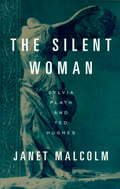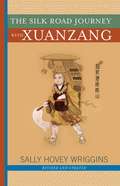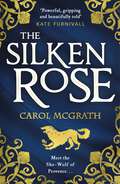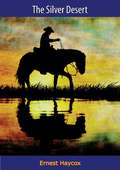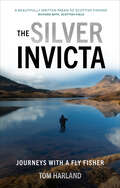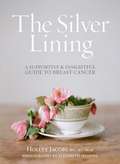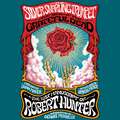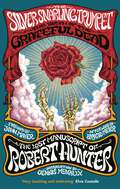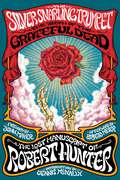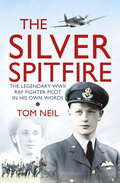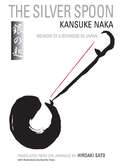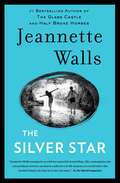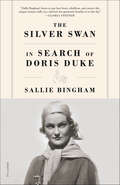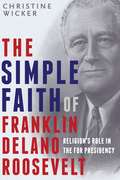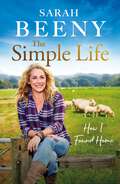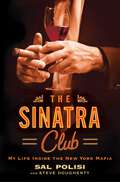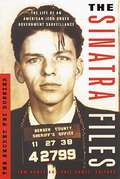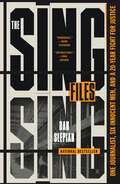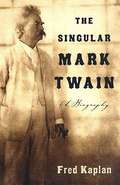- Table View
- List View
The Silent Woman: Sylvia Plath and Ted Hughes
by Janet MalcolmFrom the moment it was first published in The New Yorker, this brilliant work of literary criticism aroused great attention. Janet Malcolm brings her shrewd intelligence to bear on the legend of Sylvia Plath and the wildly productive industry of Plath biographies. Features a new Afterword by Malcolm.
The Silk Road Journey With Xuanzang
by Sally Hovey WrigginsThe Silk Road Journey with Xuanzang tells the saga of the seventh-century Chinese monk Xuanzang, one of China's great heroes, who completed an epic sixteen-year-long journey to discover the heart of Buddhism at its source in India. Eight centuries before Columbus, this intrepid pilgrim traveled 10,000 miles on the Silk Road, meeting most of Asia's important leaders at that time. In this revised and updated edition, Sally Hovey Wriggins, the first Westerner to walk in Xuanzang's footsteps, brings to life a courageous explorer and devoutly religious man. Through Wriggins's telling of Xuanzang's fascinating and extensive journey, the reader comes to know the contours of the Silk Road, Buddhist art and archaeology, the principles of Buddhism, as well as the geography and history of China, Central Asia, and India. The Silk Road Journey with Xuanzang is an inspiring story of human struggle and triumph, and a touchstone for understanding the religions, art, and culture of Asia.
The Silken Rose: The spellbinding and completely gripping new story of England's forgotten queen . . . (The She-Wolves Trilogy #1)
by Carol McGrathThey called her the She-Wolf From Provence. She'd shape the destiny of England ...Fans of Alison Weir, Anne O'Brien and Philippa Gregory, will devour this compelling new novel, starring one of English history's most fierce and courageous forgotten heroines!'Powerful, gripping and beautifully told' - Kate Furnivall, author of The Liberation'A feast for the senses and highly recommended' - Deborah Swift, author of Pleasing Mr Pepys'Well-researched . . . Fascinating' - Joanna CourtneyREADERS LOVE THE SILKEN ROSE!***** 'Stunning start to a new series of She-Wolf Queens'***** 'Spectacular . . . I will recommend this first part of her new trilogy to everyone'***** 'Fabulous . . . A lovely, highly researched tale'***** 'Exceptionally well-written . . . From the first page I was totally caught up in the story'1236. Ailenor of Provence, cultured and intelligent, is only thirteen when she meets her new husband, Henry III of England. A foreign and friendless princess in a strange land she is determined to please him. And she knows that when the times comes she must provide an heir, to secure the throne against those who would snatch it away. Rosalind, a commoner skilled in the arts of needlework and embroidery, catches the young queen's attention and a friendship blossoms. But she is unprepared for the dangerous ramifications of winning the queen's favour ... As closeness, and soon love, develops between Ailenor and Henry, so too does her influence on her husband and her power at court. As France and Wales provide constant threat, and England's barons increasingly resent her influence, Ailenor must learn to be ruthless. Who should she encourage her husband to favour? Who can she trust? Caught in a web of treachery and deceit, her choices will define the fate of England. To protect her close friends, and her beloved children, Ailenor, the She-Wolf from Provence, would do, and endure, anything ... AND DISCOVER THE DAMASK ROSE: THE SUMPTUOUS AND GRIPPING NEW NOVEL FROM CAROL MCGRATHCOMING APRIL 2021: AVAILABLE FOR PREORDER NOW!
The Silken Rose: The spellbinding and completely gripping new story of England's forgotten queen . . . (The\rose Trilogy Ser. #1)
by Carol McGrathThey called her the She-Wolf From Provence. She'd shape the destiny of England ...Fans of Alison Weir, Anne O'Brien and Philippa Gregory, will devour this compelling new novel, starring one of English history's most fierce and courageous forgotten heroines!'Powerful, gripping and beautifully told' - Kate Furnivall, author of The Liberation'A feast for the senses and highly recommended' - Deborah Swift, author of Pleasing Mr Pepys'Well-researched . . . Fascinating' - Joanna CourtneyREADERS LOVE THE SILKEN ROSE!***** 'Stunning start to a new series of She-Wolf Queens'***** 'Spectacular . . . I will recommend this first part of her new trilogy to everyone'***** 'Fabulous . . . A lovely, highly researched tale'***** 'Exceptionally well-written . . . From the first page I was totally caught up in the story'1236. Ailenor of Provence, cultured and intelligent, is only thirteen when she meets her new husband, Henry III of England. A foreign and friendless princess in a strange land she is determined to please him. And she knows that when the times comes she must provide an heir, to secure the throne against those who would snatch it away. Rosalind, a commoner skilled in the arts of needlework and embroidery, catches the young queen's attention and a friendship blossoms. But she is unprepared for the dangerous ramifications of winning the queen's favour ... As closeness, and soon love, develops between Ailenor and Henry, so too does her influence on her husband and her power at court. As France and Wales provide constant threat, and England's barons increasingly resent her influence, Ailenor must learn to be ruthless. Who should she encourage her husband to favour? Who can she trust? Caught in a web of treachery and deceit, her choices will define the fate of England. To protect her close friends, and her beloved children, Ailenor, the She-Wolf from Provence, would do, and endure, anything ... AND DISCOVER THE DAMASK ROSE: THE SUMPTUOUS AND GRIPPING NEW NOVEL FROM CAROL MCGRATHCOMING APRIL 2021: AVAILABLE FOR PREORDER NOW!
The Silver Desert: The Life Of Ernest Haycox
by Ernest HaycoxSHE BOUGHT HER WAY INTO A RANGE WAR!“You’re a wild man!”Lilly Tenant drew Tom Sebastian’s face gently to hers “You’re strong,” she whispered.“Your kisses hurt…but I don’t care…”Lilly had come to Nevada to escape from civilization—and suddenly she found herself in love with a violent, untamed Westerner.Tom owned the great Barrier ranch. He was fiercely loyal to the responsibilities of his cattle empire, and he exacted the same loyalty from his men. Lily knew that to love such a man she must give up everything…Then the Barrier was rocked by the vicious assaults of land-hungry buffalo Galt. Only Tom’s guns and guts held together his tottering empire—and Lily decided that no matter the cost she would not stay and fight beside the man she loved more than anything else.
The Silver Invicta: Journeys with a Fly Fisher
by Tom HarlandThe Silver Invicta is a stream of impressions from a fishing life, in its varying moods, colored with plenty of whisky and eccentric company. Join Tom Harland on his light-hearted journeys with his fly rod; take part in his triumphs and disasters on rough, wild camping trips and share his encounters with the wildlife of Scotland’s rivers and lochs. The ‘Silver Invicta’ was the traditional fly which was taken by Tom’s first salmon and is also a nod to the spirit of Scotland’s embattled migratory fish. Tom has fished throughout his local Scottish Borders, England, the Western Isles and New Zealand (a country he lived and worked in for two years), but his real passion is for the brown trout of the hill lochs of Assynt in the North-west Highlands. Open this treasure trove of a book to share the pleasure the author finds through fishing respectfully in magical, wild, and seldom-visited places.
The Silver Lining
by Elizabeth Messina Hollye JacobsAs a healthy, happy thirty-nine-year-old mother with no family history of breast cancer, being diagnosed with the disease rocked Hollye Jacobs's world. Having worked as a nurse, social worker, and child development specialist for fifteen years, she suddenly found herself in the position of moving into the hospital bed. She was trained as a clinician to heal. In her role as patient, the healing process became personal. Exquisitely illustrated with full-color photographs by Hollye's close friend, award-winning photographer Elizabeth Messina, The Silver Lining is both Hollye's memoir and a practical, supportive resource for anyone whose life has been touched by breast cancer. In the first section of each chapter, she describes with humor and wisdom her personal experience and gives details about her diagnosis, treatment, side effects, and recovery. The second section of each chapter is told from Hollye's point of view as a medical expert. In addition to providing a glossary of important terms and resources, she addresses the physical and emotional aspects of treatment, highlights what patients can expect, and provides action steps, including: What to do when facing a diagnosisHow to find the best and most supportive medical teamWhat questions to askWhat to expect at medical testsHow to talk with and support childrenHow to relieve or avoid side effectsHow to be a supportive friend or family memberHow to find Silver Linings Looking for and finding Silver Linings buoyed Hollye from the time of her diagnosis throughout her double mastectomy, chemotherapy, radiation, and recovery. They gave her the balance and perspective to get her through the worst days, and they compose the soul of the book. The Silver Lining of Hollye's illness is that she can now use the knowledge gleaned from her experience to try to make it better for those who have to follow her down this difficult path. This is why she is sharing her story. Hollye is the experienced girlfriend who wants to help shed some light in the darkness, provide guidance through the confusion, and hold your hand every step of the way. At once comforting and instructive, realistic and inspiring, The Silver Lining is a visually beautiful, poignant must-read for everyone who has been touched by cancer.
The Silver Saddle: Memories of Alvin Ruxer and Marty Mueller
by Bob RuxerThe Silver Saddle is about two of the most influential men in the Saddlebred industry, during the last half of the twentieth century. It is not a chronicle of their lives, but rather passes on some pearls of their wisdom. Packed full of both horse sense and common sense, this book is bound to pass on many life lessons, while keeping the mood light and humorous.
The Silver Snarling Trumpet
by Robert HunterDiscovered at last, the legendary lost manuscript of Grateful Dead co-founder and primary lyricist Robert Hunter, written in the early 1960s-a wry, richly observed, and enlightening remembrance of "the scene" in Palo Alto that gave rise to an incredible partnership of Hunter and Jerry Garcia, and then to the Grateful Dead itself-with a Foreword by John Mayer, an Introduction by Dennis McNally, and an Afterword by Brigid Meier."Strange to think back on those days when it was perfectly natural that we all slept on the floor in one small room.... These were the days before practical considerations, matters of 'importance,' began to eat our minds. We were all poets and philosophers then, until we began to wonder why we had so few concrete worries and went out to look for some."So wrote Robert Hunter in The Silver Snarling Trumpet, both a novelistic singular work of art and the missing piece of the Grateful Dead origin story. In these pages, readers are privy to the early days of Hunter, Garcia, and their cohorts, who sit at coffee shops passing around a single cup of bottomless coffee because they lacked the funds for more than one. Follow these truth-seeking souls into the stacks at Kepler's Books, renting instruments at Swain's House of Music, and through the countryside on mind-expanding road trips. Witness impromptu jams, inspired intellectual pranks, and a dialogue that is, by turns, amusing and brilliant and outrageous. Hunter shares his impressions of his first gig with Garcia for a college audience, along with descriptions of his most intense dreams and psychedelic explorations. All of it, enlivened by Hunter's visionary spirit and profound ideas about creativity and collaboration.The lost manuscript is augmented with a Foreword by John Mayer, an Introduction by Dennis McNally, and an Afterword by Brigid Meier, who was part of their scene in the San Francisco Bay Area that served as a bridge from the beatniks to the hippies. Also included is Hunter's own 1982 assessment of his work-about how he shared it with close confidants but then decided to leave it unpublished. Five years after Hunter's death, the text has been found, so readers and fans of Hunter's indelible poetry and song will see the origin of his genius and his craft.
The Silver Snarling Trumpet
by Robert HunterDiscovered at last, the legendary lost manuscript of Grateful Dead co-founder and primary lyricist Robert Hunter, written in the early 1960s-a wry, richly observed, and enlightening remembrance of "the scene" in Palo Alto that gave rise to an incredible partnership of Hunter and Jerry Garcia, and then to the Grateful Dead itself-with a Foreword by John Mayer, an Introduction by Dennis McNally, and an Afterword by Brigid Meier."Strange to think back on those days when it was perfectly natural that we all slept on the floor in one small room.... These were the days before practical considerations, matters of 'importance,' began to eat our minds. We were all poets and philosophers then, until we began to wonder why we had so few concrete worries and went out to look for some."So wrote Robert Hunter in The Silver Snarling Trumpet, both a novelistic singular work of art and the missing piece of the Grateful Dead origin story. In these pages, readers are privy to the early days of Hunter, Garcia, and their cohorts, who sit at coffee shops passing around a single cup of bottomless coffee because they lacked the funds for more than one. Follow these truth-seeking souls into the stacks at Kepler's Books, renting instruments at Swain's House of Music, and through the countryside on mind-expanding road trips. Witness impromptu jams, inspired intellectual pranks, and a dialogue that is, by turns, amusing and brilliant and outrageous. Hunter shares his impressions of his first gig with Garcia for a college audience, along with descriptions of his most intense dreams and psychedelic explorations. All of it, enlivened by Hunter's visionary spirit and profound ideas about creativity and collaboration.The lost manuscript is augmented with a Foreword by John Mayer, an Introduction by Dennis McNally, and an Afterword by Brigid Meier, who was part of their scene in the San Francisco Bay Area that served as a bridge from the beatniks to the hippies. Also included is Hunter's own 1982 assessment of his work-about how he shared it with close confidants but then decided to leave it unpublished. Five years after Hunter's death, the text has been found, so readers and fans of Hunter's indelible poetry and song will see the origin of his genius and his craft.
The Silver Snarling Trumpet: The Birth of the Grateful Dead—The Lost Manuscript of Robert Hunter
by Robert HunterDiscovered at last, the legendary lost manuscript of Grateful Dead co-founder and primary lyricist Robert Hunter, written in the early 1960s—a wry, richly observed, and enlightening remembrance of &“the scene&” in Palo Alto that gave rise to an incredible partnership of Hunter and Jerry Garcia, and then to the Grateful Dead itself—with a Foreword by John Mayer, an Introduction by Dennis McNally, and an Afterword by Brigid Meier. &“Strange to think back on those days when it was perfectly natural that we all slept on the floor in one small room.... These were the days before practical considerations, matters of &‘importance,&’ began to eat our minds. We were all poets and philosophers then, until we began to wonder why we had so few concrete worries and went out to look for some.&” So wrote Robert Hunter in The Silver Snarling Trumpet, both a novelistic singular work of art and the missing piece of the Grateful Dead origin story. In these pages, readers are privy to the early days of Hunter, Garcia, and their cohorts, who sit at coffee shops passing around a single cup of bottomless coffee because they lacked the funds for more than one. Follow these truth-seeking souls into the stacks at Kepler&’s Books, renting instruments at Swain&’s House of Music, and through the countryside on mind-expanding road trips. Witness impromptu jams, inspired intellectual pranks, and a dialogue that is, by turns, amusing and brilliant and outrageous. Hunter shares his impressions of his first gig with Garcia for a college audience, along with descriptions of his most intense dreams and psychedelic explorations. All of it, enlivened by Hunter&’s visionary spirit and profound ideas about creativity and collaboration. The lost manuscript is augmented with a Foreword by John Mayer, an Introduction by Dennis McNally, and an Afterword by Brigid Meier, who was part of their scene in the San Francisco Bay Area that served as a bridge from the beatniks to the hippies. Also included is Hunter&’s own 1982 assessment of his work—about how he shared it with close confidants but then decided to leave it unpublished. Five years after Hunter&’s death, the text has been found, so readers and fans of Hunter&’s indelible poetry and song can explore the origin of his genius and his craft.
The Silver Spitfire: The Legendary WWII RAF Fighter Pilot in his Own Words
by Tom NeilA brilliantly vivid Second World War memoir by one of 'the Few' Spitfire fighter pilots.Following the D-Day landings, Battle of Britain hero Tom Neil was assigned as an RAF liaison to an American fighter squadron. As the Allies pushed east, Neil commandeered an abandoned Spitfire as his own personal aeroplane. Erasing any evidence of its provenance and stripping it down to bare metal, it became the RAF's only silver Spitfire. Alongside his US comrades, he took the silver Spitfire into battle until, with the war's end, he was forced to make a difficult decision. Faced with too many questions about the mysterious rogue fighter, he contemplated increasingly desperate measures to offload it, including bailing out mid-Channel. He eventually left the Spitfire at Worthy Down, never to be seen again.THE SILVER SPITFIRE is the first-hand, gripping story of Neil's heroic experience as an RAF fighter pilot and his reminiscences with his very own personal Spitfire.
The Silver Spitfire: The Legendary WWII RAF Fighter Pilot in his Own Words
by Wg Cdr Tom NeilA brilliantly vivid Second World War memoir by one of 'the Few' Spitfire fighter pilots.Following the D-Day landings, Battle of Britain hero Tom Neil was assigned as an RAF liaison to an American fighter squadron. As the Allies pushed east, Neil commandeered an abandoned Spitfire as his own personal aeroplane. Erasing any evidence of its provenance and stripping it down to bare metal, it became the RAF's only silver Spitfire. Alongside his US comrades, he took the silver Spitfire into battle until, with the war's end, he was forced to make a difficult decision. Faced with too many questions about the mysterious rogue fighter, he contemplated increasingly desperate measures to offload it, including bailing out mid-Channel. He eventually left the Spitfire at Worthy Down, never to be seen again.THE SILVER SPITFIRE is the first-hand, gripping story of Neil's heroic experience as an RAF fighter pilot and his reminiscences with his very own personal Spitfire.
The Silver Spoon
by Hiroaki Sato Kansuke NakaPerhaps the most admired childhood memoir ever written in Japan, The Silver Spoon is a sharp detailing of life at the end of the Meiji period (1912) through the eyes of a boy as he grows into adolescence. Innocence fades as he slowly becomes aware of himself and others, while scene after scene richly evokes the tastes, lifestyles, landscapes, objects, and manners of a lost Japan.Kansuke Naka (1885-1965) was a Japanese poet, essayist, and novelist. He was a student of the great novelist Soseki Natsume, who lavishly praised the "freshness and dignity" of Naka's prose and encouraged the first publication of The Silver Spoon.Hiroaki Sato is a writer, reviewer, and translator with over forty works of classical and modern Japanese poetry, prose, and fiction published in English. He has received the PEN American Center Translation Prize and the Japan-U.S. Friendship Commission Prize for the Translation of Japanese Literature. He lives in New York City and writes a monthly column on politics and society for the Japan Times.
The Silver Star: A Novel
by Jeannette WallsIt is 1970. 'Bean' Holladay is twelve and her sister Liz fifteen when their artistic mother Charlotte, a woman who 'flees every place she's ever lived at the first sign of trouble', takes off to 'find herself'. She leaves the girls enough money for food to last a month or two. But when Bean gets home from school one day and sees a police car outside the house, she and Liz board a bus from California to Virginia, where their widowed Uncle Tinsley lives in the decaying antebellum mansion that has been in the family for generations. An impetuous optimist, Bean discovers who her father was and learns many stories about why their mother left Virginia in the first place. Money is tight, so Liz and Bean start babysitting and doing office work for Jerry Madox, foreman of the mill in town, a big man who bullies workers, tenants and his wife. Bean adores her whip-smart older sister, inventor of word games, reader of Edgar Allan Poe, non-conformist. But when school starts in the autumn, it is Bean who easily adjusts and makes friends, and Liz who becomes increasingly withdrawn. And then something happens between Liz and Maddox...
The Silver Swan: In Search of Doris Duke
by Sallie Bingham“Shows us just how brave, rebellious, and creative this unique woman really was, and how her generosity benefits us to this day.” —Gloria SteinemIn The Silver Swan, Sallie Bingham chronicles the notorious tobacco heiress who was perhaps the greatest modern woman philanthropist. Duke established her first foundation when she was twenty-one; cultivated friendships with Jackie Kennedy, Imelda Marcos, and Michael Jackson; flaunted interracial relationships; and adopted a thirty-two year-old woman she believed to be the reincarnation of her deceased daughter.Even though Duke was the subject of constant scrutiny, little beyond the tabloid accounts of her behavior has been publicly known. When her personal papers were made available, Sallie Bingham set out to discover her true identity. She found an alluring woman whose life was forged in the Jazz Age, who was not only an early war correspondent but also an environmentalist, a surfer, a collector of Islamic art, a savvy businesswoman who tripled her father’s fortune, and a major philanthropist with wide-ranging passions from dance to historic preservation to human rights.In The Silver Swan, Bingham dissects the stereotypes that have defined Duke’s story while also confronting the disturbing questions that cleave to her legacy.“Illuminating . . . Bingham is a generous biographer in this exacting, measured work.” —Publishers Weekly“The most significant, dramatic, and compelling biography of Doris Duke. . . . that will delight and inspire all readers concerned about a more humane future.” —Blanche Wiesen Cook, author of Eleanor Roosevelt (vols. I, II, III)
The Simple Faith of Franklin Delano Roosevelt: Religion's Role in the FDR Presidency
by Christine WickerIn The Simple Faith of Franklin Delano Roosevelt, religion journalist and author Christine Wicker establishes that faith was at the heart of everything Roosevelt wanted for the American people. This powerful book is the first in-depth look at how one of America's richest, most patrician presidents became a passionate and beloved champion of the downtrodden--and took the country with him. Those who knew Roosevelt best invariably credited his spiritual faith as the source of his passion for democracy, justice, and equality. Like many Americans of that time, his beliefs were simple. He believed the God who heard his prayers and answered them expected him to serve others. He anchored his faith in biblical stories and teachings. During times so hard that the country would have followed him anywhere, he summoned the better angels of the American character in ways that have never been surpassed.
The Simple Life: The unmissable memoir from one of Britain’s most loved presenters
by Sarah BeenyJoin Sarah Beeny on her journey to live more simply and find her forever home...Throughout her life, Sarah Beeny has been obsessed with the idea of home. From her childhood growing up in a countryside cottage to renovating her very first flat in London to restoring a stately home in Yorkshire, she has never been afraid of the hard work needed to turn a house into a home. Now, in her most recent adventure, Sarah and her family have moved to a former dairy farm in Somerset to build the home of their dreams. In The Simple Life, Sarah will tell the story of her life, sharing tales and experiences in everything including parenting, property, friendships, nature and the environment, all the way through to her recent cancer diagnosis and treatment. Through it all, Sarah tackles challenges and troubles with signature wit and wisdom, discovering life is never as 'simple' as you'd like it to be.
The Sinatra Club: My Life Inside the New York Mafia
by Sal PolisiThe Mob was the biggest, richest business in America—too dangerous and too deadly to fail. Until it was destroyed from within by drugs, greed, and the decline of its traditional crime Family values. And by guys like Sal Polisi. He was born in Brooklyn—the same place that spawned Murder, Inc., Al Capone, and John Gotti, the future Mob godfather who became his friend. Polisi was raised on a family legacy that led him into the life he loved as a member of the Colombos, one of the New York Mob’s feared Five Families, and came of age when the Mafia was at the height of its vast wealth and power. Known by his Mob name, Sally Ubatz (“Crazy Sally”), he ran an illegal after-hours gambling den, The Sinatra Club, that was a magic kingdom of crime and a hangout for up-and-coming mobsters like Gotti and the three wiseguys immortalized in Martin Scorsese’s GoodFellas—Henry Hill, Jimmy Burke, and Tommy DeSimone. For Polisi, the nonstop thrills of glory days spent robbing banks, hijacking trucks, pulling daring heists—and getting away with it all, thanks to cops and public servants corrupted by Mob money—were fleeting. When he was busted for drug trafficking, and already sickened by the bloodbath that engulfed the Mob as it teetered toward extinction, he flipped and became one of a breed he had loathed all his life—a rat. In this riveting, pulse-pounding, and, at times, darkly hilarious first-person chronicle of his brazen crimes, wild sexual escapades, and personal tragedies, Polisi tells his story of life inside the New York Mob in a voice straight from the streets. With shocking candor, he draws on a hard-won knowledge of Mob history to paint a neverbefore- seen picture of the inner workings of the Mob and the larger-than-life characters who populated a once extensive and secret underworld that, thanks to guys like him, no longer exists. *** I was always a street guy. I was into robbing and stealing and gambling and loan sharking. I wasn’t involved in the bigmoney sit-downs, the labor racketeering and construction company shakedowns, the Garment District and garbage and cement company kickbacks. . . . For guys like me and Fox, my blood brother and crime partner, the thing we loved about being in that life was the action, the excitement. . . .We were in it for the money, sure. But it was the danger, the thrills that made the life of crime something special. A guy like John Gotti was different. He was far more ambitious than me and Fox. He wasn’t just in it for the rush and the riches. He wanted the power and the glory. John Gotti’s tragedy, if you can call it that, was that he was born too late for the old-school gangster crown that he craved. He began his rise as the Mob was beginning to crumble; by the time he got to the top, the bottom had dropped out. From the beginning, John was charismatic and smart. He just wasn’t cut out to be godfather. Once he became boss, he drove the bus right off the bridge. Or maybe it was the bus that drove him. Either way, I watched him go. Here’s how it all happened.
The Sinatra Files: The Secret FBI Dossier
by Phil Kuntz Tom KuntzAn American Icon Under Government Surveillance When Frank Sinatra died in 1998, he was one of the most chronicled celebrities ever, but the most unusual record of his life came to light only posthumously: a 1,275-page dossier recording decades of FBI surveillance stemming from J. Edgar Hoover's belief that Sinatra had mob or Communist ties. This shadow biography, with information never before presented in book form, details: Hoover's search through Sinatra's past to see if he got a bogus medical deferment from military service, ultimately yielding the simple fact that Sinatra really had suffered a perforated eardrum as a youthThe FBI's previously unreported cooperation with journalists looking for dirt on Sinatra, including one who had recently been punched out by the singerNumerous instances of the star's carousing and intemperate behavior -- including a detailed report alleging that he rampaged through a Las Vegas hotel after he and his wife Mia Farrow lost small fortunes gamblingThe mob's attempts to curry favor with John F. Kennedy through Sinatra -- and its anger when Attorney General Robert F. Kennedy turned up the heat. This fascinating record of governmental scrutiny will captivate every Sinatra fan, as well as anyone who wants to understand the second half of the American century -- the Cold War, popular culture, the cult of celebrity, Camelot, and the FBI's mania for investigating American citizens -- all personified by the most dominant entertainer of the era.
The Sing Sing Files: One Journalist, Six Innocent Men, and a Twenty-Year Fight for Justice
by Dan SlepianAn NBC Dateline producer's cinematic account of his two-decade journey navigating the broken criminal justice system to help free six innocent menIn 2002, Dan Slepian, a veteran producer for NBC’s Dateline, received a tip from a Bronx homicide detective that two men were serving twenty-five years to life in prison for a 1990 murder they did not commit.Haunted by what the detective had told him, Slepian began an investigation of the case that eventually resulted in freedom for the two men and launched Slepian on a two-decade personal and professional journey into a deeply flawed justice system fiercely resistant to rectifying—or even acknowledging—its mistakes and their consequences.The Sing Sing Files: One Journalist, Six Innocent Men, and a Twenty-Year Fight for Justice is Slepian’s account of challenging that system. The story follows Slepian on years of prison visits, court hearings, and street reporting that led to a series of powerful Dateline episodes and eventually to freedom for four other men and to an especially deep and lasting friendship with one of them, Jon-Adrian “JJ” Velazquez. From his cell in Sing Sing, JJ aided Slepian in his investigations until his own release in 2021 after decades in prison.Like Bryan Stevenson’s Just Mercy, The Sing Sing Files is a deeply personal account of wrongful imprisonment and the flaws in our justice system, and a powerful argument for reckoning and accountability. Slepian’s extraordinary book, at once painful and full of hope, shines a light on an injustice whose impact the nation has only begun to confront.
The Single Files: A Journey of Fears, Hopes, and Dreams
by Ahuva ParnesMy date is arriving in an hour. Mina is pounding on my door, she wants to see me dressed; it's time to get ready. I'm hoping. I'm davening. I'll let you know how things go. At twenty-five, Ahuva Parnes is tired of the pitying glances, the condescending comments, the well-meaning advice. She's ready to move on in life, to join the ranks of the sheitel-wearing young women all around her. But somehow the right one hasn't shown up yet. As she waits, Ahuva opens her own business, reaches out to her students, and tries to fill her days with meaningful activities. But it's hard to feel fulfilled when your twin is expecting her second child, your younger sister is anxious to start dating, and people tell you that you're sabotaging your own future. In this intriguing true story, we ride the roller coaster of emotions that accompanies Ahuva on every date. We join her in hotel lobbies and museums and wonder... Will she ever find the person she's been waiting for?
The Single Ladies of Jacaranda Retirement Village: an uplifting tale of love and friendship
by Joanna NellA moving, funny, heartwarming tale of love and friendship, for anyone who loved The Unlikely Pilgrimage of Harold Fry, The Keeper of Lost Things and Three Things About Elsie.'Hugely entertaining . . . funny and heart-warming' Woman & Home'A gentle, warm-hearted book that had me rooting for all the characters and laughing out loud at points'' LIBBY PAGE, author of The LidoIt's never too late to grow old disgracefully...The life of 79-year-old pensioner Peggy Smart is as beige as the décor in her retirement village. Her week revolves around aqua aerobics and appointments with her doctor. The highlight of Peggy's day is watching her neighbour Brian head out for his morning swim. Peggy dreams of inviting the handsome widower - treasurer of the Residents' Committee and one of the few eligible men in the village - to an intimate dinner. But why would an educated man like Brian, a chartered accountant no less, look twice at Peggy? As a woman of a certain age, she fears she has become invisible, even to men in their eighties.But a chance encounter with an old school friend she hasn't seen in five decades - the glamorous fashionista Angie Valentine - sets Peggy on an unexpected journey of self-discovery. Can she channel her 'inner Helen Mirren' and find love and friendship in her twilight years?(P)2018 Hachette Australia
The Singular Mark Twain: A Biography
by Fred KaplanThe fact that Samuel Langhorne Clemens came to use his pen name, Mark Twain, in his personal letters and in his personal life is significant to Kaplan (English literature, Queens College) because it demonstrates the extent to which he was a unified, singular, individual, integrating his life and his art. In Kaplan's sympathetic biography, charges of racism are countered by descriptions of the growth of Twain's progressivism (as well as his anti-imperialism), especially during his later years in virtual exile from the United States. Annotation ©2004 Book News, Inc. , Portland, OR (booknews. com)
The Sins of the Father: Joseph P. Kennedy and the Dynasty He Founded
by Ronald KesslerBiography of Joseph Kennedy.
